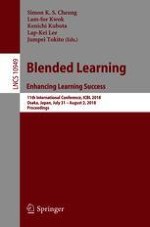2018 | OriginalPaper | Chapter
The Influence of Culture on the Use of Information Technology in Learning in Hong Kong’s Higher Education
Authors : Kwan-Keung Ng, Ching-Hong Luk, Wai-Ming Lam
Published in: Blended Learning. Enhancing Learning Success
Publisher: Springer International Publishing
Activate our intelligent search to find suitable subject content or patents.
Select sections of text to find matching patents with Artificial Intelligence. powered by
Select sections of text to find additional relevant content using AI-assisted search. powered by
